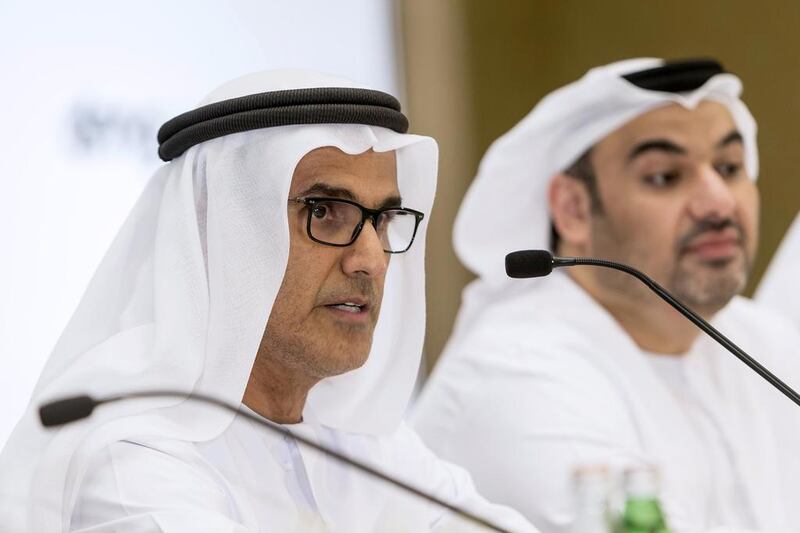Abu Dhabi National Oil Company is targeting cost savings of 25 per cent on major oil projects, according to a top official.
“From Adnoc’s point of view we are trying to bring down operating expenditures and also on [capital expenditures] in the range of 25 per cent,” said Ali Khalifa Al Shamsi, the head of strategy and coordination at Adnoc.
He was speaking ahead of next week's Abu Dhabi International Petroleum and Exhibition Conference (Adipec), an annual event in the capital that has become one of the world's largest oil industry gatherings, where top executives from international private sector oil companies and state firms typically discuss deals and major projects.
The costs-saving target is more ambitious than the 10 to 15 per cent that Yasser Saeed Al Mazrouei, Adnoc’s deputy director of exploration and production, said in May the state company was targeting.
Mr Al Shamsi noted yesterday the 60 per cent drop in the oil price since summer 2014 has led to sharp cuts in capital investment – estimated at 20 to 30 per cent, or more than US$100 billion worldwide.
This also means that powerful state companies such as Adnoc can expect much better terms from the oil firms subcontracted to develop their large projects.
“Our plan has not changed” in terms of the major onshore and offshore developments being planned, said Mr Al Shamsi. “But we are trying to streamline, [and] working very hard to optimise field development and take advantage of the market.”
Adnoc has a large number of major onshore and offshore oil and gas projects that form an overall plan to boost oil production capacity from about 2.8 million barrels per day at the end of last year to 3.5 million bpd by the end of 2017.
These include plans to increase production at individual fields in the onshore company – Abu Dhabi Company for Onshore Operations (Adco) – and a number of large offshore developments under the umbrella of Abu Dhabi Marine Operating Company (Adma-Opco).
Yet another main topic of discussion is if the Supreme Petroleum Council, will announce further awards on the Adco concession at Adipec.
Earlier this year, France’s Total was awarded a 10 per cent stake as well as the leadership in developing the most sought-after fields in that concession, which runs for 40 years.
Total had to pay about $2.2 billion for the stake and commit to development plans after intensive negotiations that included talks during last year’s Adipec.
Others awarded concessions include Inpex of Japan and Korea’s GS Energy (backed by Korea National Oil), which represent the UAE’s largest and most reliable oil-buying customers.
There is still 22 per cent of Adco left to allocate and major holders in the old concession, which expired at the end of 2013, were lobbying hard at last year’s Adipec to win stakes under the updated terms. But it is not clear if BP and Shell, who had equal shares with Total in the old concession, are still enthusiastic bidders given the industry downturn.
Adnoc, meanwhile, has continued to spend big on its projects. This year it awarded a $330 million contract to China Petroleum Engineering and Construction Corporation, part of China National Petroleum Corp, to help develop the onshore Mender oilfield.
Last week, Schlumberger said in its third-quarter results that it had been awarded a major contract by Adma-Opco to supply equipment for two offshore fields.
The Middle East has remained a steady source of projects even while they have been curtailed in many other oil provinces globally. For example, Abu Dhabi-based Gulf Marine Services (GMS), a provider of offshore jack-up barges, said that despite seeing some downturn globally as a result of low oil prices, demand in the region has remained robust.
“Worldwide we are seeing some pain, but again in the Middle East, production is still very high and projects are proceeding as anticipated,” said Duncan Anderson, the chief executive of GMS.
amcauley@thenational
leannegraves@thenational.ae
Follow The National's Business section on Twitter





